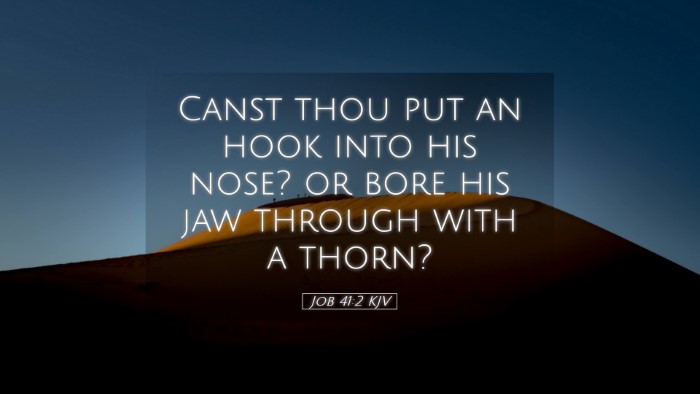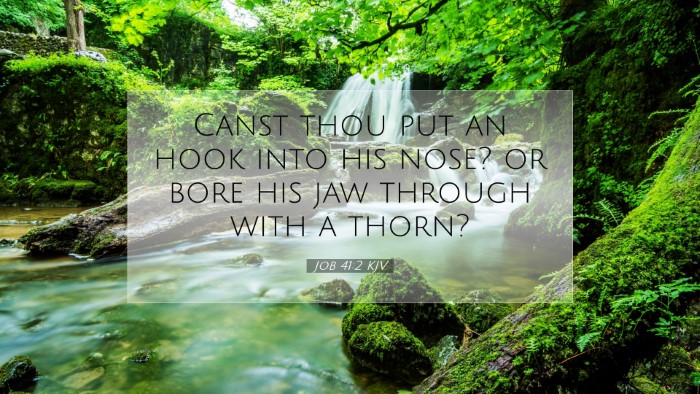Commentary on Job 41:2
Verse: "Canst thou put a hook into his nose? or bore his jaw through with a thorn?"
Introduction
The dialogue between God and Job in the Book of Job reaches a compelling juncture in chapter 41, where God challenges Job's understanding of the created world. This verse specifically highlights the might and untamable nature of the creature (commonly interpreted as Leviathan), serving as a metaphor for the powers that God wields over creation. Ancient scholars and theologians have drawn various interpretations from this rich text, reflecting on themes of divine sovereignty, human limitations, and the complexities of faith.
Insights from Public Domain Commentaries
1. Matthew Henry’s Commentary
Matthew Henry emphasizes that God's questions regarding the creature's tamability serve to remind Job of the limitations of human strength and ingenuity. He notes:
- The imagery of a hook and a thorn illustrates mankind's utter inadequacy when facing such formidable creatures.
- This rhetorical question signifies that no human effort can subdue God's creations, reinforcing the need to recognize divine authority and power.
Henry elaborates that the purpose of these queries is not to belittle Job but to elevate his understanding of God's greatness. Job's previous discourse is met with divine questions that provoke introspection about the nature of creation and the Creator.
2. Albert Barnes’ Notes
Albert Barnes sheds light on the interpretation of Leviathan as a representation of chaos and wickedness. He states:
- “The question posed by God indicates that the Leviathan cannot be captured or controlled, symbolizing the boundaries of human power.”
- Each imagery in the question compels one to consider the futility of mankind trying to dominate forces beyond their understanding.
Barnes further argues that the description of the Leviathan serves as an analogy for the cosmic struggle between good and evil, portraying a creature that cannot be tamed or subdued by human hands, thereby exemplifying the profound gap between divine wisdom and human oversight.
3. Adam Clarke’s Commentary
Adam Clarke interprets the imagery of piercing the jaw with a thorn as an ancient method of capturing animals, reflecting the futility of trying to exert control over the Leviathan:
- "The verse underscores the significance of recognizing the majesty of God’s creation."
- "God is demonstrating to Job that the creature represents divine might that surpasses any attempt at human manipulation."
Clarke's reflections suggest that the emphasis is placed on God’s omnipotent capacity to govern creation in ways that humanity cannot comprehend or replicate, inviting readers to adopt a posture of reverence and humility.
Theological Implications
This verse encapsulates significant theological themes that resonate deeply within Christian thought:
- Divine Sovereignty: The question posed by God illustrates His absolute authority over the natural and supernatural realms. The creature's untameable nature serves to remind believers of God's control over all aspects of existence.
- Human Limitations: The imagery of attempting to pierce the jaw of a creature as powerful as Leviathan reflects the limitations of human strength and wisdom, encouraging a humble recognition of our place within creation.
- Faith in Divine Providence: In the face of life's uncertainties and uncontrollable circumstances symbolized by Leviathan, believers are called to trust in God’s overarching plan and purpose, even when circumstances appear chaotic.
Conclusion
Job 41:2 serves as a powerful reminder of the chasm between divine omnipotence and human frailty. The careful examinations provided by Matthew Henry, Albert Barnes, and Adam Clarke offer profound insights that encourage deeper investigation into the nature of God and the challenges of faith in the light of suffering. For pastors, students, theologians, and scholars, this verse is not merely a literary artifact but a rich source for understanding the nature of God’s creation and the human condition.


